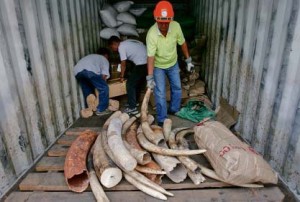
ELEPHANT tusks from Tanzania were found inside two container in this photo taken in Manila on May 20, 2009. INQUIRER FILEPHOTO
CEBU CITY—Security guards on Friday prevented government investigators from entering a church in Talisay City where religious statues made from “blood ivory” are allegedly kept.
The church guards blocked the agents of the Department of Environment and Natural Resources (DENR) and the National Bureau of Investigation (NBI) from inspecting the Diocesan Shrine of Jesus without a search warrant.
The shrine was set up by Catholic priest Cristobal Garcia, who is suspected of involvement in the smuggling of ivory, which is used to make religious statues. An international wildlife conservation convention, to which the Philippines is a signatory, bans the trade in ivory to prevent the slaughter of elephants for their tusks.
Security guards at the Catholic shrine told investigators they would have to speak to the priest’s lawyers first, according to Eddie Llamedo, the DENR spokesperson. He conceded the team did not have a search warrant at the time and would have to obtain the proper legal papers.
Asked about the incident, Cebu archdiocese spokesperson Monsignor Achilles Dakay said “the lawyers are taking care of that. We will be cooperating (with authorities) but we have church lawyers”.
Garcia was cited in a National Geographic article as giving advice on how to smuggle ivory and naming carvers who could turn it into religious statues. The article has touched off a nationwide investigation into the smuggling of ivory, and particularly its use in making religious statues in this largely Roman Catholic country.
After the National Geographic article was published, the Catholic Church revealed Garcia had been suspended in June after the Vatican began an investigation into allegations he sexually abused two altar boys decades ago.
Garcia, who is known to have a large collection of ivory statues, has been sick and confined in a Manila hospital, keeping him out of the public eye.
The probe, initially focused on Garcia, has expanded to other owners of ivory figures, amid concerns the trade is extensive, said NBI environment division chief Sixto Comia.
The DENR wants collectors of ivory to present sales invoices or otherwise prove that their ivory items were acquired before 1981, the year the Philippines signed the Convention on International Trade in Endangered Species of Wild Fauna and Flora (CITES). With an AFP report


